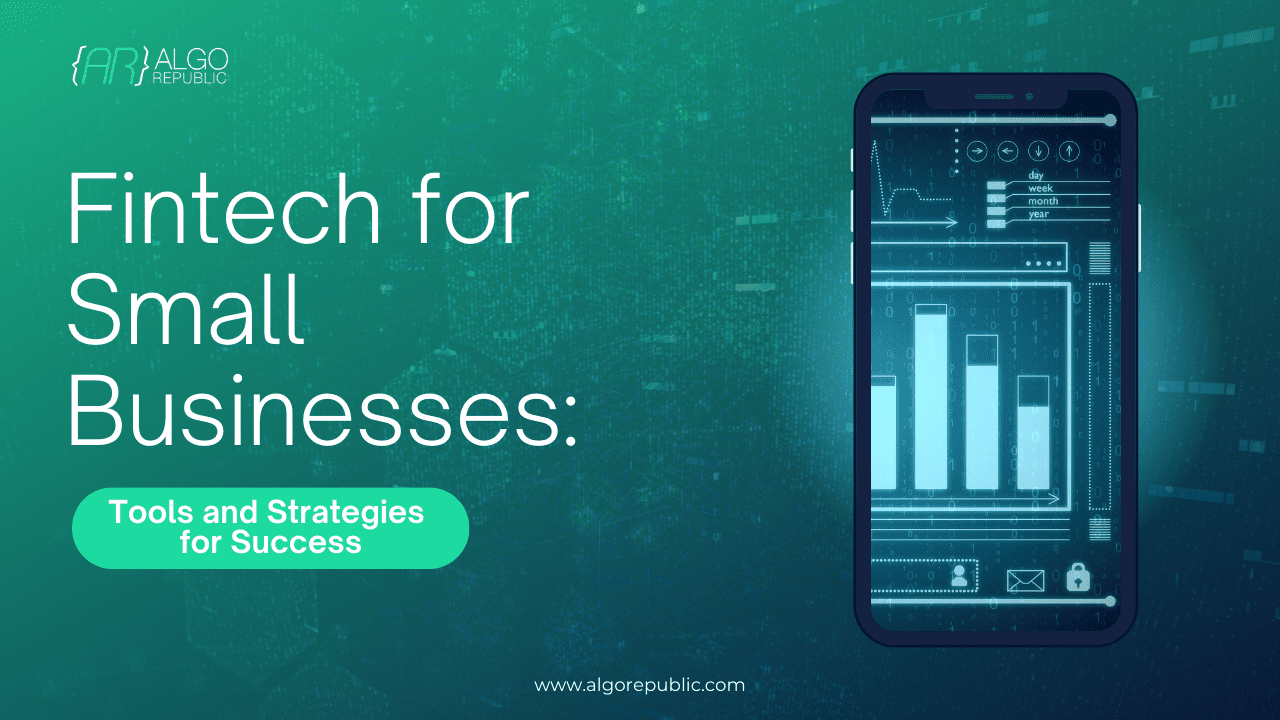Table of Contents
In today’s fast-paced business landscape, small enterprises are continually seeking ways to stay competitive and thrive. Fintech, a fusion of finance and technology, has emerged as a powerful ally in this journey. With a myriad of tools and strategies, fintech is reshaping the financial landscape for small businesses. Here, we explore how fintech solutions, ranging from AI and blockchain to user-centric UI/UX design, are empowering small businesses to reach new heights.
Small Business Unlocking Efficiency with AI and ML:
In the realm of fintech, Artificial Intelligence (AI) and Machine Learning (ML) stand as transformative forces. Small businesses are increasingly turning to these technologies to streamline their financial operations. AI-powered chatbots, for instance, enable 24/7 customer support, addressing queries, and processing transactions with unmatched efficiency.
ML algorithms can analyze vast amounts of transaction data, helping businesses gain insights into consumer behavior, make informed financial decisions, and even predict market trends. By automating routine tasks and providing valuable data-driven insights, AI and ML technologies empower small businesses to operate more efficiently and competitively in today’s fast-paced financial landscape.
Blockchain Revolutionizing Transactions:
Blockchain technology has ushered in a new era of trust and transparency in the world of finance, and small businesses are harnessing its potential. For instance, supply chain financing is benefiting from blockchain’s immutable ledger, where each transaction is recorded and time-stamped, reducing disputes and fraud. Cross-border transactions, historically laden with fees and delays, are becoming seamless and cost-effective through blockchain-powered solutions.
Moreover, small businesses are adopting blockchain for secure and tamper-proof record-keeping, ensuring the integrity of financial data. This innovative technology not only streamlines financial processes but also fosters trust among partners and customers.
The Power of User-Centric UI/UX Design:
User Experience (UX) and User Interface (UI) design are pivotal in the fintech space, where the clarity and ease of financial transactions directly impact customer satisfaction. Small businesses are recognizing that a well-designed fintech app or platform can be a competitive advantage.
User-centric design principles ensure that financial products and services are not only functional but also intuitive and visually appealing. An easy-to-navigate UI, clear data visualization, and efficient workflows contribute to an enjoyable user experience. When customers find it effortless to use fintech solutions, they are more likely to engage with the business, leading to increased loyalty and revenue.
Cybersecurity for Financial Safeguarding:
With the increasing digitization of financial processes, cybersecurity has become a paramount concern for small businesses. In the fintech realm, where sensitive financial data is processed, robust cybersecurity measures are non-negotiable. Encryption protocols safeguard data in transit and at rest, ensuring that financial information remains confidential and secure.
Multi-factor authentication adds an additional layer of protection, mitigating the risk of unauthorized access. Regular security audits and vulnerability assessments help small businesses identify and address potential weaknesses in their fintech systems. By investing in cybersecurity, businesses not only protect themselves and their customers from data breaches but also build trust and credibility in the market.
Exploring Emerging Technologies:
To remain competitive, small businesses in the fintech sector are venturing into the realm of emerging technologies. Flutter, Google’s open-source UI toolkit, has gained popularity for its ability to create versatile, cross-platform fintech applications. With a single codebase, businesses can reach customers across various devices, making their financial services more accessible.
On the other hand, MERN Stack development offers a full-stack framework for building dynamic fintech applications. It integrates MongoDB, Express.js, React, and Node.js to create scalable and responsive fintech platforms that can adapt to evolving market demands. By embracing emerging technologies like Flutter and MERN Stack, small businesses position themselves at the forefront of fintech innovation, ready to meet the needs of today’s digital consumers.
In conclusion, fintech is a game-changer for small businesses, providing tools and strategies that were once reserved for large enterprises. From AI-driven automation to blockchain’s transparency and user-centric design, fintech is democratizing financial innovation. With cybersecurity vigilance and a readiness to explore emerging tech, small businesses can seize the opportunities fintech presents and thrive in today’s digital economy.
If you are a small business looking for efficient tech solutions to upgrade your business, Algorepublic is here to help you bring your vision to life.
Source: Fintech for Small Business: How Financial Technology



